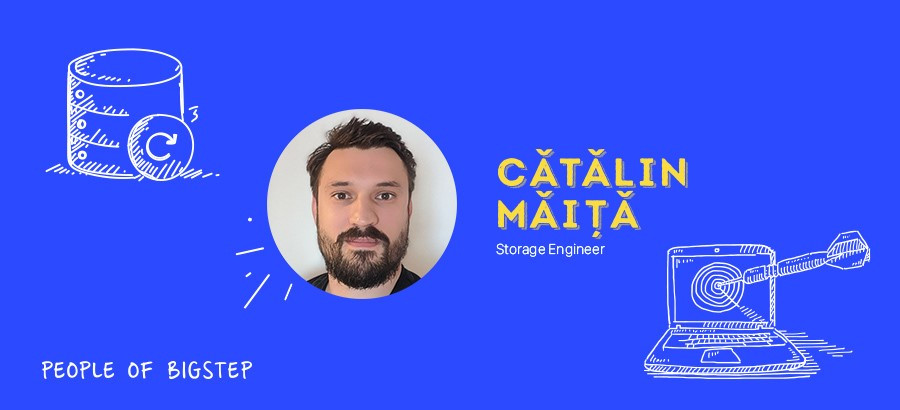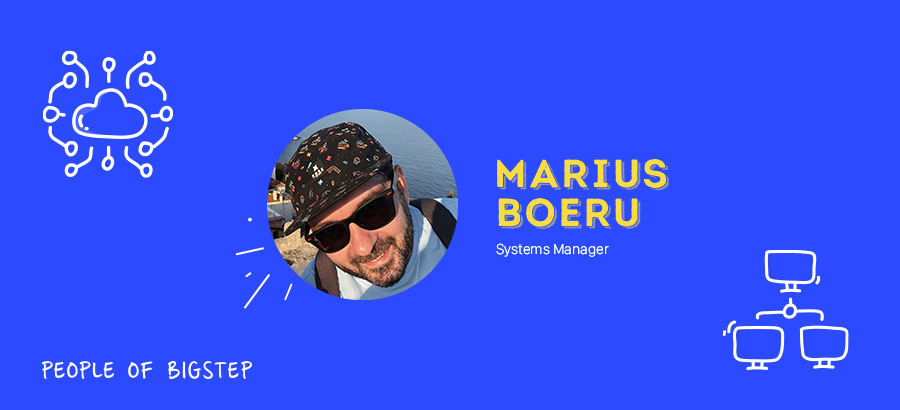- Advertising
- Bare Metal
- Bare Metal Cloud
- Benchmarks
- Big Data Benchmarks
- Big Data Experts Interviews
- Big Data Technologies
- Big Data Use Cases
- Big Data Week
- Cloud
- Data Lake as a Service
- Databases
- Dedicated Servers
- Disaster Recovery
- Features
- Fun
- GoTech World
- Hadoop
- Healthcare
- Industry Standards
- Insurance
- Linux
- News
- NoSQL
- Online Retail
- People of Bigstep
- Performance for Big Data Apps
- Press
- Press Corner
- Security
- Tech Trends
- Tutorial
- What is Big Data
[People of Bigstep] Catalin Maita – “Storage engineering is vital in the planning phases of a new project”
From storage engineering, debugging, redundancy, backup, disaster recover, home storage systems, to sports, Catalin, Storage Engineer at Bigstep, discusses with us both the intricacies of disks and storage, and his hobbies. What is the next big thing in the storage industry? Which are some best practices for backup and disaster recovery? How would Catalin describe our product to a non-tech person? Which sports does he enjoy, and why? Read all these and more in this new People of Bigstep interview.

Hi Catalin, please tell us a few words about yourself.
Hello. I’m an active, sociable guy with a taste for both the digital world and nature. Working as a Storage Engineer for Bigstep taught me unique professional skills and put me in touch with some really cool people. All of this added up to 10 years of work experience in the IT sector, years in which I worked with some cool proprietary and open-source software, as well as hardware solutions in both telecom and enterprise business environments.
What’s your position within the company and how does your work day look like?
I am currently working as a Storage Engineer for Bigstep. Involved in both operations and systems development areas, my expertise spans from solving storage related issues that arise, debugging various problems, maintaining current storage solutions, and being part of some exciting new projects.
How does storage engineering fit into the system administration world?
Storage engineering proved itself to be vital in the planning phases of a new project, where subjects as redundancy, backup, disaster recovery or storage scalability are discussed. It also can bring some valuable advantages if storage best practices and QOS are well applied for the desired workloads, making future system administration quite effortless.
You mentioned redundancy, backup, and disaster recovery, topics that are on everyone’s mind these days. Can you tell us some best practices when it comes to disaster recovery?
Business continuity and integrity doesn’t come cheap That’s why, maybe the best practice for a disaster recovery solution would be also the most costly one and that would be a hot site, mirroring the production site from the actual hardware to the data that’s being almost instantly synchronized.
Other approaches to a disaster recovery scheme are also available, each with its own trade-offs. A warm site can be deployed and it will act as a backup site with less hardware power and hence, less operational capacity and probably with an older set of backed up data. Or a DRaaS can be used, which acts as a failover solution for the production environment with increased latency and decreased operational capacity.
How does one become a specialist in storage?
First of all, you have to like its perks. For me, it’s that and the fact that I was lucky enough to be exposed from an early age to technology. Secondly, you need to read a lot about it, to interact with both known vendor solutions and open-source technologies and just try stuff out, have a testbed environment where you can break and fix things up.
Can you tell us what differentiates Bigstep Metal Cloud from similar products on the market when it comes to storage?
Bigstep offers a modern and reliable storage solution for a metal cloud environment. The flexible storage backend provided by Bigstep works smoothly along with the automated system to provide metal cloud servers fast iSCSI boot times and easy to re-spawn metal servers.
What are some of the use cases where Metal Cloud is the best fit from your point of view?
Getting a fast scalability option to expand your business server capacity for a limited amount of time is one of the use cases that I can think about.
In what ways would a fellow storage engineer benefit from using Metal Cloud?
Fast deployment of a testbed where a storage engineer can test out various Linux flavors: having the option of installing filesystems and volume managers at his own choosing, and playing around with the newest technologies, that is one. Having the option of snapshotting his work and later on reverting back to some early point in time is, again, a nice feature to have.
How would you describe our product to a non-tech, business person?
The metal cloud product offered by Bigstep is the closest thing to a personal physical server in your own premise, when it comes to performance, ownership and control of the server in a seamless cloud environment. On top of that add security, great scalability opportunities, and professional support tier.
Having your applications on a secure and performant bare metal server and not being worried about a server hardware fault to corrupt your data are the main advantages of the bare metal approach. One can also take advantage of fast starting or stopping of the infrastructure without deleting the data, with the option to re-spawn the servers at a later date.
What do you think the next big thing in the storage industry is?
Many small companies diverge their focus either on cloudifying their storage approach and abstracting the cloud providers to have seamless access of the data, while others seem to go into the opposite direction and pour resources into creating or consolidating their own internal storage networks due to security concerns. One direction or the other, there are a few new technologies that need to be mentioned, technologies that have good traction and potential, such as PCIe Gen5 with CXL 2.0, innovations in storage class memory, and Nvidia’s Data Processing Units.
How do you stay up to date on new developments in storage and tech? Can you recommend some particular websites that you follow?
Some cool discussions and topics I found out to be on Reddit, on the r/Storage and r/DataHoarder subreddits. Arstechnica is more of a mainstream tech news website but it has well documented articles about new technologies. Phoronix struck me quite a few times with vendor specific reviews and since then I became a fan. For reliable information on disks benchmarks I browse the Backblaze website.
Do you also run a home storage system? What kind of data do you keep on it?
I used to have a home storage server with zfs and nfs and samba, holding all my valuable data. But I went more mainstream and now I quite enjoy a small setup from Synology. I’m keeping some important scanned documents, regular backups, photos, as well as some old memorabilia deprecated software packs.
As a hobby, you enjoy sports. Which are the sports that you enjoy practicing or watching?
During the pandemic I found myself to be watching sports that didn’t get my attention previously, such as Formula-E, F1, or darts. It got me wondering why sports are so appealing to me and reached the conclusion that I really enjoy the sincerity, objectivity, and the community that sports and competitions manage to create inside and around them, no matter how big the differences between people are. As for myself, soccer, table tennis, and biking are the ones that I practice most frequent.
Did you manage to practice these hobbies during the pandemic?
Most of them, yeah, since they involve some kind of social distancing. Not so much for traveling, exploring new places, or hiking. As for my other hobbies, they’ve thrived during this pandemic. Things that I enjoyed before, like cooking, watching movies, gardening, philosophy and psychology reading became daily treats.

What common challenges have you encountered in your work as storage engineer and in your hobbies, and how do you overcome them?
In the professional area of my life, maybe the switch from a deeply corporate environment to a startup-like work medium and getting acquainted with all its perks. Switching from a vendor-based interaction to an open-source mentality also posed some difficulties from time to time. But like in my personal life, I learned that patience and a positive mentality help a lot.
Which are the three things that you enjoy most about working at Bigstep?
Bigstep has its small company charms that I do really enjoy. One of them is the fact that my opinions and ideas are heard, discussed and implemented and that means a lot to me. The people that I encountered at Bigstep are amazing, I’ve made really good friends, I learned a lot from them, and I really enjoy working alongside them and overcoming whatever difficulties we encounter.
As a specialist in everything storage-related, Catalin has written two in-depth articles on modern storage technologies and ZFS. Check them out and leave your questions or suggestions in the comment section.
Readers also enjoyed:

[People of Bigstep] Marius Boeru: "If I can automate something, I probably will :)"


Leave a Reply
Your email address will not be published.